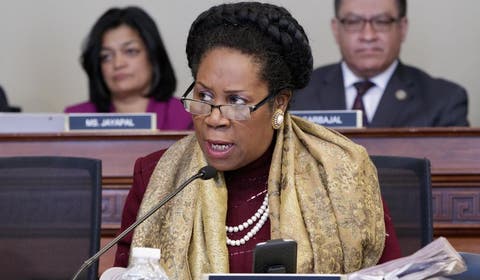
Rep. Sheila Jackson Lee, D-Texas, opposes the Republican health care bill during work by the House Budget Committee, on Capitol Hill in Washington, Thursday, March, 16, 2017. (AP Photo/J. Scott Applewhite)
By Jeff Mordock - The Washington Times - Wednesday, February 17, 2021
House Democrats pushed forward a reparations plan for Black Americans on Wednesday despite tepid support from President Biden and stiff opposition from Republicans.
As a first step to making the country pay for past racism, Democrats want to establish a commission to examine slavery and discrimination dating back to 1619 and recommend appropriate remedies.
Rep. Sheila Jackson Lee, who authored the reparations bill known as H.R. 40, said no level of opposition would discourage the quest.
“We believe in determination, and we believe in overcoming the many bad balls that we have been thrown; we’ve caught them, and we’ve kept on going. That is not the point of H.R. 40,” the Texas Democrat said at a hearing on the bill. “Now more than ever, the facts and circumstances facing our nation demonstrate the importance of H.R. 40 and the necessity of placing our nation on the path to reparative justice.”
The push for reparations, which could include financial compensation and education initiatives to make amends for past injustices to Black Americans, presents a major test for President Biden’s allegiance to racial-justice activists.
His tepid support for the measure separated him from the other Democratic presidential candidates, including Vice President Kamala Harris who enthusiastically endorsed the bill.
White House Press Secretary Jen Psaki on Wednesday said the president supports the essence of the bill. She would not say whether the president backs reparations.
“He supported a study of reparations, which I believe is what is being discussed and studying the continued impacts of slavery, which is being discussed in this hearing,” Ms. Psaki said.
Asked whether Mr. Biden would support the bill itself, Ms. Psaki said, “We will see what happens through the legislative process.”
Kamm Howard, the national male co-chair of the National Coalition of Blacks For Reparations, said at Wednesday’s hearing that Mr. Biden eventually won’t have any choice but to support reparations.
“The president would have a duty to move the legislation that his party in Congress is favorable to,” he said.
Reparations have been discussed before in Congress but did not advance far in the legislative process. This time, the idea gained steam after last year’s police-brutality protests and Democrats’ takeover of Washington power.
Still, the legislation will need significant backing to clear the narrowly divided House and Senate.
Republicans on the Judiciary Committee called the bill “divisive and polarizing.”
Rep. Burgess Owens, a Utah Republican who is Black, blasted Democrats for holding the hearing, saying it gave Black Americans false hope.
“It is impractical and a non-starter for the U.S. government to pay reparations. It is unfair and heartless to give Black Americans hope that this is a reality,” he said.
Mr. Owens, whose great-great-grandfather came to America aboard a slave ship, said the commission threatens to perpetuate racial stereotypes.
“The reality is that Black American history is not one of a hapless, hopeless race that is oppressed by a more powerful White race,” he said, adding that “millions of wealthy and middle class” Blacks have achieved the American dream.
Tom McClintock, California Republican, said the reparations effort would further divide the nation.
“I can’t imagine a more divisive, polarizing or unjust measure than one that would by government force, require people who never owned slaves to pay reparations to those who never were slaves based not on anything they’ve done but because of what race they were born,” said Mr. McClintock, who is White.
However, a parade of witnesses called by the Democratic majority testified that reparations are necessary to compensate for myriad inequities facing Black Americans. Those disparities include wages, benefits and almost every other measure of economic well-being, they said.
Scholars testified that health disparities in communities of color can be traced back to slavery.
They pointed to statistics showing Black Americans died from COVID-19 at a higher rate than their White countrymen and Black Americans have received disproportionately fewer vaccinations.
“The issue of slavery is one that did not end with the stroke of Abraham Lincoln’s pen and the Emancipation Proclamation,” Hilary O. Shelton, head of the NAACP’s Washington office, said during his testimony. “Many of the residuals of the trans-Atlantic slave trade sadly, as we look at the disparities in data, are still very much with us.”
A bill to create a federal reparations commission was first introduced by Rep. John Conyers, Michigan Democrat, in 1989.
Although the measure had been introduced several times over the past three decades, it has never received a floor vote. Congress last held a hearing on the legislation two years ago.
The new reparations bill appears to have more momentum along with other racial justice measures. Mr. Biden made racial justice a top priority as soon as he arrived in the White House, taking executive action to advance fair housing, overhaul federal prison policies and seek “equity” in agency actions and programs.
The reparations bill garnered support from House Speaker Nancy Pelosi, California Democrat, and a total of 162 Democratic co-sponsors.
A companion bill introduced in the Senate has 17 co-sponsors.
No Republicans in the House or Senate have signed on to the bills.
The legislation also is backed by more than 300 organizations, including the U.S. Conference of Mayors, the NAACP and the American Civil Liberties Union.
• Seth McLaughlin contributed to this report.
Source
No comments:
Post a Comment